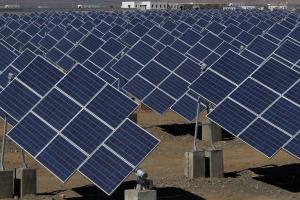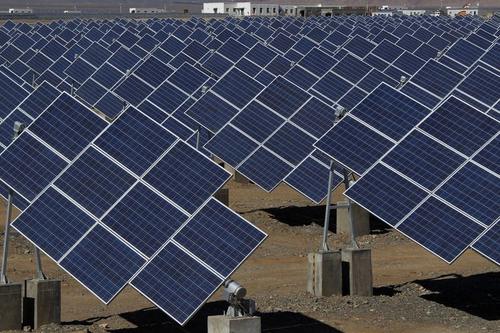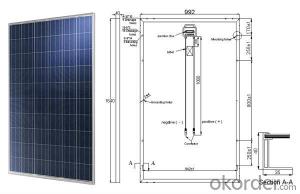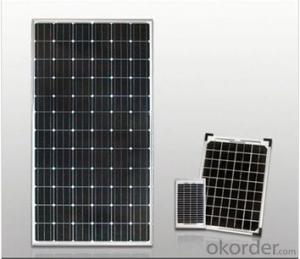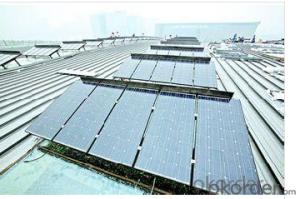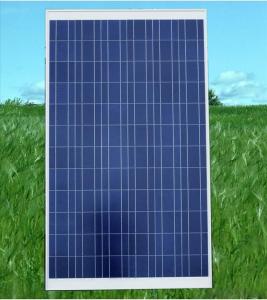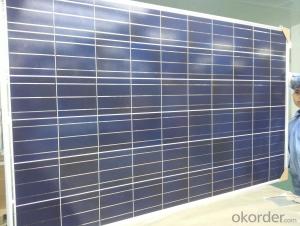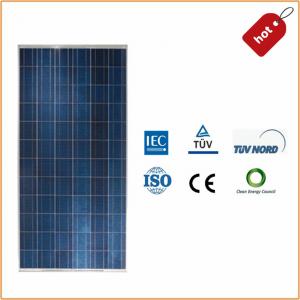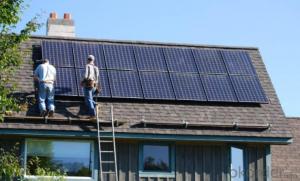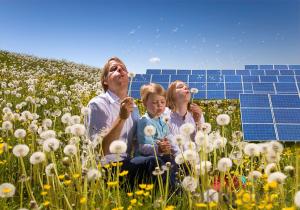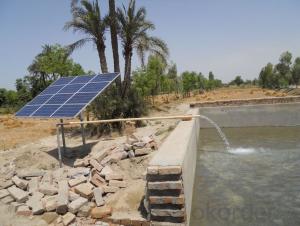Consumer Reports Best Solar Panels - Solar Module Poly 305W
- Loading Port:
- China Main Port
- Payment Terms:
- TT OR LC
- Min Order Qty:
- -
- Supply Capability:
- -
OKorder Service Pledge
OKorder Financial Service
You Might Also Like
Solar Module
ABOUT YINGLI GREEN ENERGY
Yingli Green Energy Holding Company Limited (NYSE: YGE) is one of
the world’s largest fully vertically integrated PV manufacturers, which
markets its products under the brand “Yingli Solar“. With over 7.0GW
of modules installed globally, we are a leading solar energy company
built upon proven product reliability and sustainable performance. We
are the fi rst renewable energy company and the fi rst Chinese company
to sponsor the FIFA World CupTM.
PERFORMANCE
- High effi ciency, multicrystalline silicon solar cells with high transmission
and textured glass deliver a module effi ciency of up to 16.0%,
minimizing installation costs and maximizing the kWh output of your
system per unit area.
- Tight positive power tolerance of 0W to +5W ensures you receive
modules at or above nameplate power and contributes to minimizing
module mismatch losses leading to improved system yield.
- Top ranking in the “TÜV Rheinland Energy Yield Test” and the
“PHOTON Test” demonstrates high performance and annual energy
production.
RELIABILITY
- Tests by independent laboratories prove that Yingli Solar modules:
Fully conform to certifi cation and regulatory standards.
Withstand wind loads of up to 2.4kPa and snow loads of up to
5.4kPa, confi rming mechanical stability.
Successfully endure ammonia and salt-mist exposure at the highest
severity level, ensuring their performance in adverse conditions.
- Manufacturing facility certifi ed by TÜV Rheinland to ISO 9001:2008,
ISO 14001:2004 and BS OHSAS 18001:2007.
WARRANTIES
- 10-year limited product warranty1.
- Limited power warranty1: 10 years at 91.2% of the minimal rated power
output, 25 years at 80.7% of the minimal rated power output.
1In compliance with our Warranty Terms and Conditions.
QUALIFICATIONS & CERTIFICATES
IEC 61215, IEC 61730, MCS, CE, ISO 9001:2008, ISO 14001:2004, BS OHSAS
18001:2007, PV Cycle, SA 8000
ELECTRICAL PERFORMANCE
Electrical parameters at Standard Test Conditions (STC)
Module type YLxxxP-29b (xxx=Pmax)
Power output Pmax W 260 255 250 245 240
Power output tolerances ΔPmax W 0 / + 5
Module effi ciency ηm % 16.0 15.7 15.4 15.1 14.8
Voltage at Pmax Vmpp V 30.3 30.0 29.8 29.6 29.3
Current at Pmax Impp A 8.59 8.49 8.39 8.28 8.18
Open-circuit voltage Voc V 37.7 37.7 37.6 37.5 37.5
Short-circuit current Isc A 9.09 9.01 8.92 8.83 8.75
Electrical parameters at Nominal Operating Cell Temperature (NOCT)
Power output Pmax W 189.7 186.0 182.4 178.7 175.1
Voltage at Pmax Vmpp V 27.6 27.4 27.2 27.0 26.8
Current at Pmax Impp A 6.87 6.79 6.71 6.62 6.54
Open-circuit voltage Voc V 34.8 34.8 34.7 34.6 34.6
Short-circuit current Isc A 7.35 7.28 7.21 7.14 7.07
STC: 1000W/m2 irradiance, 25°C cell temperature, AM1.5g spectrum according to EN 60904-3.
Average relative effi ciency reduction of 3.3% at 200W/m2 according to EN 60904-1.
NOCT: open-circuit module operation temperature at 800W/m2 irradiance, 20°C ambient temperature, 1m/s wind speed.
OPERATING CONDITIONS
Max. system voltage 1000VDC
Max. series fuse rating 15A
Limiting reverse current 15A
Operating temperature range -40°C to 85°C
Max. static load, front (e.g., snow) 5400Pa
Max. static load, back (e.g., wind) 2400Pa
Max. hailstone impact (diameter / velocity) 25mm / 23m/s
CONSTRUCTION MATERIALS
Front cover (material / thickness) low-iron tempered glass / 3.2mm
Cell (quantity / material / dimensions /
number of busbars)
60 / multicrystalline silicon / 156mm x 156mm / 2 or 3
Encapsulant (material) ethylene vinyl acetate (EVA)
Frame (material / color / anodization color /
edge sealing) anodized aluminum alloy / silver / clear / silicone or tape
Junction box (protection degree) ≥ IP65
Cable (length / cross-sectional area) 1000mm / 4mm2
Plug connector
(type / protection degree) MC4 / IP67 or YT08-1 / IP67 or Amphenol H4 / IP68
PACKAGING SPECIFICATIONS
Number of modules per pallet 29
Number of pallets per 40' container 28
Packaging box dimensions
(L / W / H) 1700mm / 1135mm / 1165mm
Box weight 568kg
Unit: mm
• Due to continuous innovation, research and product improvement, the specifi cations in this product information sheet are subject to change
without prior notice. The specifi cations may deviate slightly and are not guaranteed.
• The data do not refer to a single module and they are not part of the offer, they only serve for comparison to different module types
- Q: What are the advantages of using solar panels?
- There are several advantages of using solar panels. Firstly, solar panels produce clean and renewable energy, which helps reduce greenhouse gas emissions and combat climate change. Secondly, solar energy is abundant and free, reducing the dependence on fossil fuels and providing a sustainable source of power. Additionally, solar panels can save homeowners and businesses money on their electricity bills by generating their own energy. Finally, solar panels require minimal maintenance and have a long lifespan, making them a cost-effective and reliable energy solution.
- Q: Hey guys :)Well I'm in the middle of doing my PSHCE coursework on sustainable energy, focusing on solar panels. I just wanted to ask you what your opinions are of them? Are they really worth it? Are they sustainable? Will they reduce our energy bills? Those sort of questions :)If you are interested in installing solar panels, please mention that, as it would be great! There's lots of information about them on this site ----
- Bing solar power in Germany. Solar power has an option of assisting in removing some of the burden during daylight, from power generation plants. Anything is a help. Plus they will continue to do it forever (at least a lifetime). But they are not the total answer. Like wind, limited to certain areas. Wave generation is another solution, but still limited to coastal areas. The current design of most supply grids does not allow transportation of power long distances. You want a real eye opener, Bing transportation line looses power grid and see how much energy is wasted, and the amount of carbon put into the air for these losses.
- Q: What is the principle and structure of solar panels?
- inverter: solar direct output are generally 12VDC, 24VDC, 48VDC. In order to provide power to 220VAC appliances, it is necessary to convert the DC power from the solar power system into AC power, so it is necessary to use DC-AC inverter.
- Q: Can I add more solar panel let say up to 200 watt and adding two 2 volts battery using the same charges controller and power inverter?
- That charge controller is notoriously cheap and burns up easily. If you are going add solar panels, also buy another charge controller to go with them. They can both be connected to the same battery bank. I don't believe the kit comes with batteries, so you would buy whatever size 2V battery bank your power requirements call for. The size of the inverter depends entirely on what you are going to power with it, not the size of the panel array. As long as you are not powering anything that is over the 300W rating, you don't need a new one. Just be sure to check the details of the inverter, is it 300W continuous, or can it handle up to a 300W surge? Also, it's a modified sine wave inverter instead of a pure sine wave inverter, so don't plug any sensitive electronics into it. They may not work, or you may get a buzz or hum from it.
- Q: How do solar panels impact the electric bill?
- Solar panels can significantly reduce or even eliminate the electric bill for homeowners. By generating clean and sustainable energy from sunlight, solar panels can offset the amount of electricity needed from the grid. Excess energy produced by solar panels can be fed back into the grid, earning credits or monetary compensation through net metering. Ultimately, solar panels can lead to substantial savings on the electric bill over time.
- Q: What happens to solar panels during a power outage?
- During a power outage, solar panels do not generate electricity as they rely on the grid for their functioning. This is because most solar panel systems are grid-tied, meaning they are designed to feed excess power back into the grid and draw power from the grid when needed. However, some off-grid solar systems equipped with battery storage can continue to operate during a power outage, providing electricity to the connected devices or storing excess energy for later use.
- Q: Do solar panels require direct sunlight to generate electricity?
- Yes, solar panels do require direct sunlight to generate electricity. While they can still generate some electricity on cloudy days or in indirect sunlight, their efficiency is significantly reduced without direct sunlight.
- Q: Can solar panels be installed on a streetlight?
- Yes, solar panels can be installed on a streetlight. This allows the streetlight to be powered by solar energy, reducing the reliance on traditional electricity sources and making it more sustainable.
- Q: Can solar panels be installed on a warehouse or storage facility?
- Yes, solar panels can be installed on a warehouse or storage facility. In fact, warehouses and storage facilities are often ideal locations for solar panel installations due to their large, flat rooftops and ample space for arrays. Installing solar panels can help these facilities reduce their electricity bills, lower their carbon footprint, and even generate additional income through various incentive programs.
- Q: How could I find out what the amp output of a solar panel? Specifically, I want to know how many milliamps can the solar panel on a Casio fx-260 put out?
- You need full sunshine from the sun, or a lamp that will give a light spectrum similar to the sun, a volt meter, Milli-amp meter, and a variable resistor of 0 to 000 ohms. The voltmeter test leads go across the solar cell leads. The amp meter leads will be in series with the solar cell. Let's say, positive lead of the solar cell to the the positive lead of the amp meter, the negative lead of the amp meter to one terminal of the variable resistor, and the wiper terminal of the variable resistor to the negative lead of the solar cell. Slowly decrease the value of the resistor until the voltage from the solar cell just begins to drop. Take note of the amp meter reading. This is about the high end range of the solar cell. You might want to begin with a micro-amp meter for the current meter.
Send your message to us
Consumer Reports Best Solar Panels - Solar Module Poly 305W
- Loading Port:
- China Main Port
- Payment Terms:
- TT OR LC
- Min Order Qty:
- -
- Supply Capability:
- -
OKorder Service Pledge
OKorder Financial Service
Similar products
Hot products
Hot Searches
Related keywords
